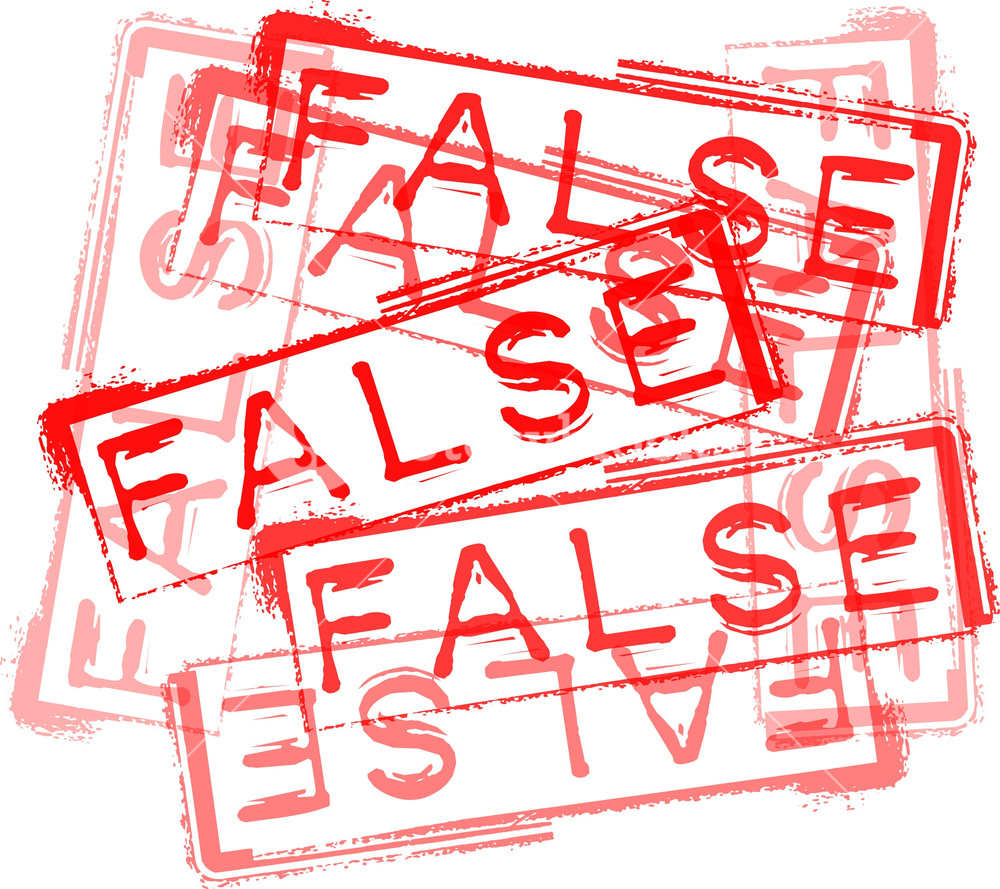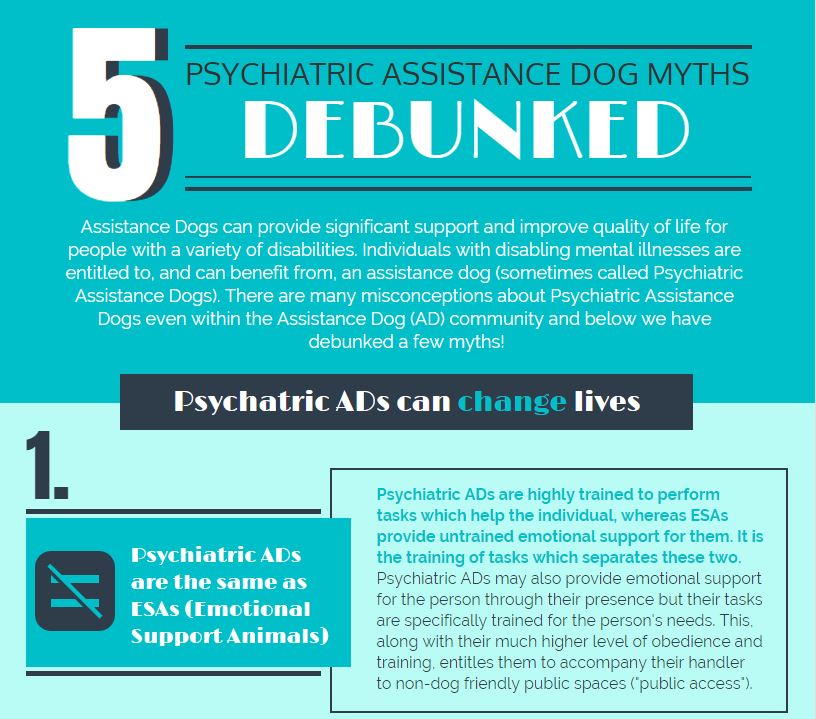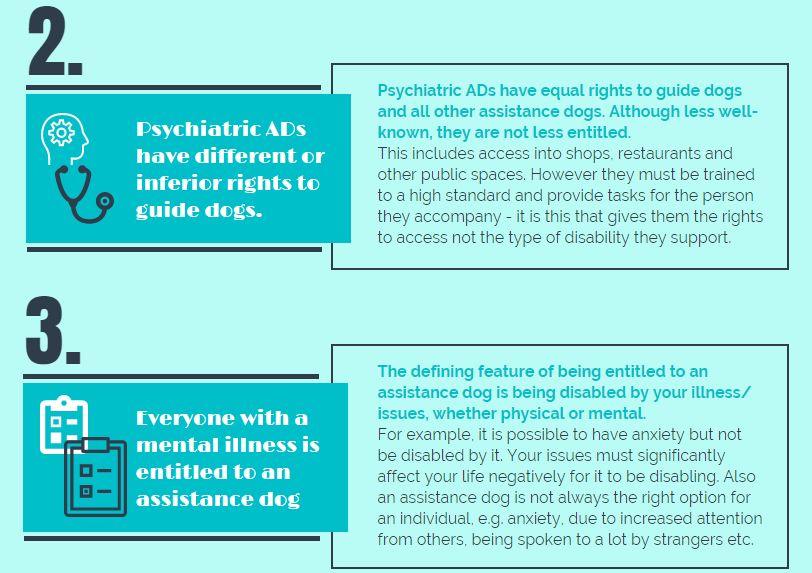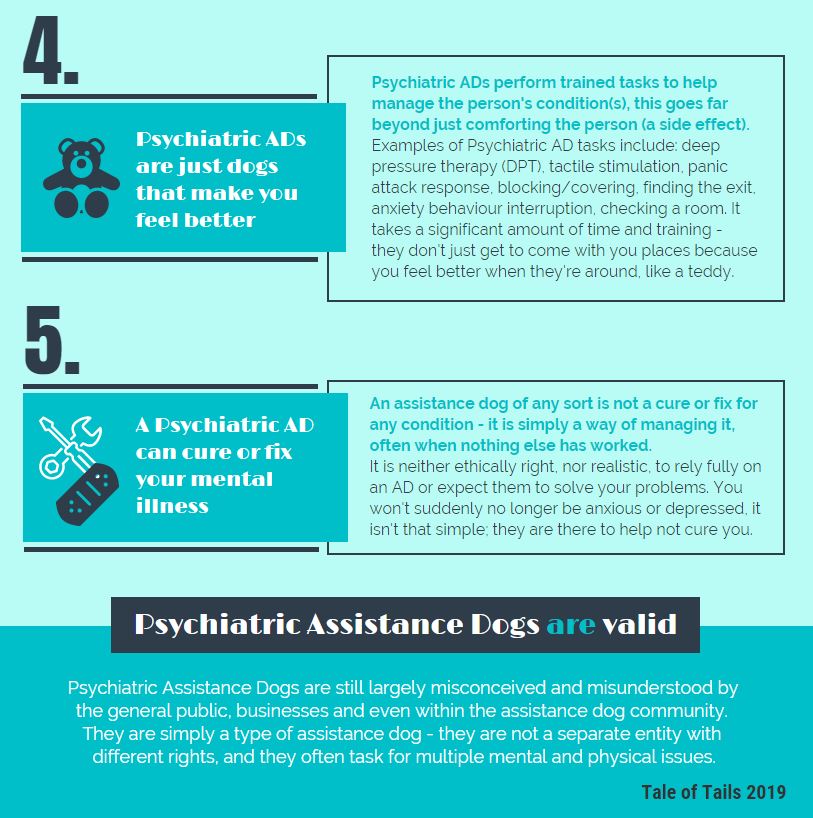
WE ADDRESS THE MANY AREAS OF MISINFORMATION SURROUNDING ASSISTANCE DOGS
Some of the misinformation and myths originate in the lack of detail in the law, some is due to confusion between other countries and the UK, some comes from misconceptions in society (e.g. whether what is common is the only thing that exists) and some, unfortunately, comes from within the community itself. We seek to rectify this, especially within the community as we need to all be on the same page.
Assistance Dogs In General
There is often the misconception that assistance dogs are trained to help a person with their disability. When in fact the dog is trained to help with symptoms of their disability. This is an important distinction as diagnosis is not what determines disability, and some people could have a diagnosed illness that is not disabling, whereas another individual would be disabled by the same illness. This is a commonly held misconception within the Assistance Dog community and it can result in confusion and upset.
Registering an Assistance Dog
This is the most common question asked by people, so putting it simply… you can’t. There is no U.K. government recognised registration system in place for Assistance Dogs. You can get accredited to an organisation, and this may mean you have a certificate, a named vest, a ‘qualification’ (by your organisation’s standards) and/or an ID booklet (e.g. through ADUK you get given a yellow ID booklet), but as a general rule this does not (and should not) grant you more access rights than not being accredited. U.K. law does not state assistance dogs must be accredited with an organisation.
Types of Assistance Dog
You may hear that a dog is identified as a “guide dog” – in fact you likely heard of that before you heard of Assistance Dogs (if you ever heard of them at all before this!) That is because they have received greater press coverage and are a large organisation. However, they are NOT separate to Assistance Dogs. They are merely a type of Assistance Dog. In the same way as these: “hearing dog”, “mobility assistance dog”, “seizure detection/response dog”, “medical alert/response dog”, “diabetic alert dog”, “psychiatric assistance dog”. They are all OPTIONAL subcategories. We discuss the relevance of identifying titles for Assistance Dogs in our blog post here.
ESAs in the UK
As addressed on our page ESA, Therapy, Assistance, Service Dogs there is a misconception that Emotional Support Animals, or companion animals, are recognised by law in the UK and therefore are exempt from the usual housing laws surrounding no pets etc. This is false in the UK – it is based on the United States where ESAs are recognised by law and have certain rights, but not public access rights. That is not to say that companion animals do not ‘exist’ or do not have a beneficial impact; rather it is saying that UK law does not recognise them as anything other than a pet that provides comfort, in which case they are still regarded as a pet.

An example of a very misleading website which is certainly fooling many people (while taking their money) is Emotional Support Animal UK Registry. While this acknowledges that ESAs do not have the same legal rights as trained assistance animals by UK law, it also says that with a special badge you might be able to “take your Emotional Support Animal companion shopping” and states that “ESAUK registrations are helping change those laws” which there is no sign of at all, FOR GOOD REASON. (They are not trained!!) It also gives businesses a chance to register as “ESA Friendly” (which is legally just the same as pet friendly). Currently, due to a “lack of access to medical professionals” they don’t even require a letter from a medical professional [which was the only vaguely acceptable part of this – in that it is how it works in the USA!] so there is no limit to who can supposedly “register” their “ESA”. This is misguiding and illegal and is manipulating vulnerable people, giving them false ideas, while fraudulently taking a minimum of £50 from them for effectively nothing. They also use the phrase “medical psychological assistance animals” in their advertising for their ESA registry…the two things are not the same…as we discuss in the section below…
Psychiatric Assistance Dogs
We address a lot of the myths above, and in our other pages, however we felt it was important to specifically address the myths around Psychiatric Assistance Dogs. We created the resource below to debunk five of the main myths and misconceptions about them. We found this to be very necessary as we repeatedly encounter the same commonly held false ideas in handlers and the general public alike. We also believe that people can’t have the right information until they are given it and that this should be easily accessible, especially to those with disabilities.
Debunking myths is important – false information can cause harm to many people as well as perpetuating confusion and incorrect perceptions, which has a wide-reaching impact. So we aim to prioritise debunking myths about Assistance Dogs and related topics in order to minimise this impact.




